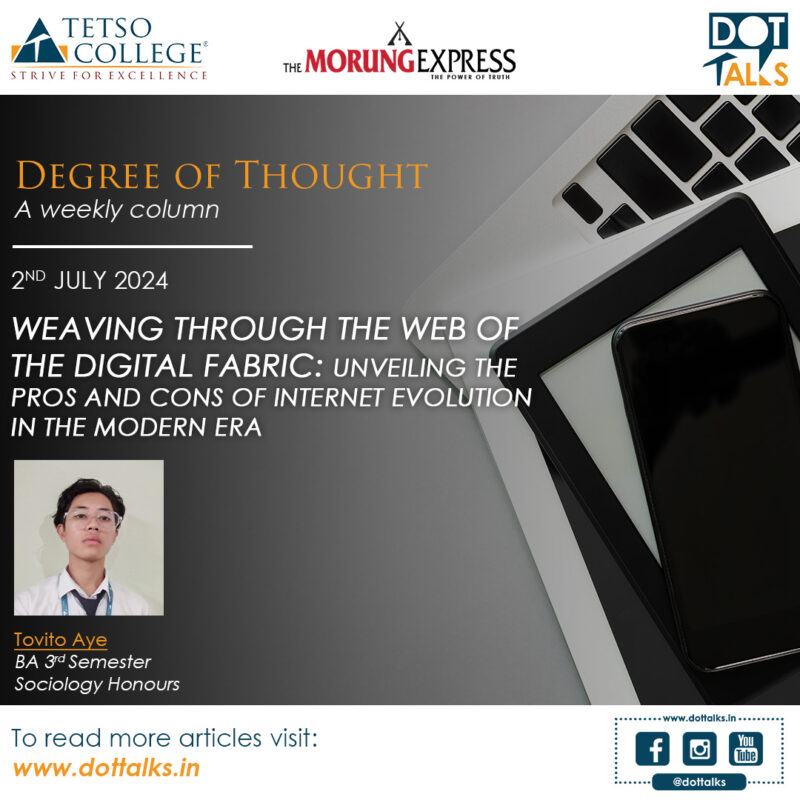
Weaving Through the Web of the Digital Fabric: Unveiling the Pros and Cons of Internet Evolution in the Modern Era
In the vast expanse of the digital world, information flows like threads woven into a complex fabric. By patiently untangling the threads of this fabric, we gain the knowledge and skills to navigate this ever-evolving landscape.
In the contemporary era, the ubiquitous term “internet” is widely recognized, with its manifold applications permeating various facets of human existence. A succinct historical overview traces the inception of the internet back to ARPANET, an acronym denoting the Advance Research Project Agency Net, established in 1969. Functioning with a distributed control system, ARPANET marked the nascent stages of internet development, eventually culminating in its public accessibility in 1991. It is imperative to underscore that the internet’s conceptualization was a collective effort, and its evolution owes its trajectory to the collaborative contributions of diverse scientists and engineers.
The inception of networking technology saw the amalgamation of research endeavours, giving rise to ARPANET. Subsequent innovations by luminaries such as Bob Kahn and Vinton Cerf, the American computer scientist credited with the development of TCP/IP protocols, propelled the transformation of ARPANET into the expansive internet we navigate today. Cerf, notably, is attributed with the inaugural written utilization of the term ‘internet’.
Defined as a global system of interconnected computer networks, the internet protocol suite facilitates seamless communication and file transfers among devices and networks. Facilitating global connectivity, the internet empowers individuals to access a vast repository of information, thereby fostering a networked society.
Enumerating the advantages or pros of internet usage reveals a plethora of benefits.
Firstly, instantaneous access to information emerges as a salient advantage. Technological advancements and internet capabilities enable rapid searches, offering users information tailored to temporal relevance and user-rated credibility. Consequently, users can access pertinent and up-to-date information, thereby enhancing their informational resources.
Secondly, the internet serves as an expansive learning platform, affording users the opportunity to acquire knowledge on a diverse array of subjects. Resources such as research papers, online courses, videos, tutorials, case studies, and live news broadcasts contribute to a wealth of educational materials. Open-source communities and forums like Reddit and Quora further augment the learning experience, fostering knowledge dissemination.
Thirdly, the internet’s role in enhancing efficiency and expediency is noteworthy. Facilitating streamlined communication and collaboration within and beyond organizational boundaries, the internet contributes to process automation, increased productivity, and improved business communications. High-speed internet connections, in particular, catalyse advancements in corporate performance.
Fourthly, the internet seamlessly facilitates communication across vast distances. Through its interconnected network, individuals can communicate remotely, bridging geographical gaps within seconds. This attribute ensures that geographical disparities do not impede communication, reinforcing interpersonal connections.
Lastly, the advent of social networking sites represents a recent advantage of the internet. Platforms like Facebook, Instagram, and Telegram foster community-building, enabling individuals with shared interests to connect, share, and express opinions. This mode of socialization presents a contemporary form of communal engagement.
However, the laudable advantages of the internet are paralleled by notable drawbacks. Foremost among these is the susceptibility to cyber breaches, where malevolent actors exploit system vulnerabilities to extract sensitive information through email, websites, applications, and software. Consequently, the security of internet-transmitted data remains a perpetual concern.
Another consequential drawback pertains to the potential erosion of real-life socialization. While internet-enabled social networking contributes to virtual community-building, it concurrently restricts face-to-face interactions, potentially diluting the depth of human connections observed in bygone eras.
Cybercriminal activities, including identity theft and fraud, represent a significant peril associated with internet usage. Unauthorized access to personal information can lead to nefarious criminal activities, jeopardizing individuals’ privacy and security.
Internet addiction emerges as a pervasive disadvantage, particularly prevalent among teenagers engrossed in online gaming and social media consumption. This behavioural pattern fosters a preference for virtual reality over real-life interactions, contributing to heightened levels of aggression and clinical depression in the absence of internet access.
Moreover, the internet has been implicated in diminishing attention spans, attributable to the plethora of easily accessible online entertainment options. This phenomenon results in an average human attention span of less than a minute, necessitating frequent cognitive shifts.
In summation, the internet stands as an unparalleled fount of information and connectivity, shaping contemporary existence in multifaceted ways. Nonetheless, the attendant pitfalls, including cyber vulnerabilities, social disconnection, and addictive behaviours, underscore the imperative of judicious and conscientious internet usage. As a potent tool in the modern age, the internet demands vigilant oversight to mitigate its inherent risks.
As we explore the applications and resources online, we must be mindful of the threads that connect to our personal data. Developing strong cybersecurity practices and advocating for user privacy are crucial aspects of responsible digital citizenship. The digital world can be endlessly captivating, but it’s important to maintain a healthy balance. Encouraging responsible use of technology, including taking breaks and engaging in real-world activities, helps us avoid getting tangled in the digital fabric at the expense of our well-being.
Disseminating awareness regarding the potential drawbacks is crucial, fostering a collective responsibility to navigate the digital landscape with prudence and circumspection.
Degree of Thought is a weekly community column initiated by Tetso College in partnership with The Morung Express. Degree of Thought will delve into the social, cultural, political and educational issues around us. The views expressed here do not reflect the opinion of the institution. Tetso College is a NAAC Accredited UGC recognised Commerce and Arts College. The editorial team includes Chubamenla, Asst. Professor, Dept. of English and Rinsit Sareo, Asst. Manager, IT, Media & Communications.
For feedback or comments please email: dot@tetsocollege.org

